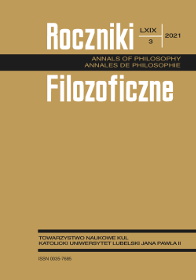How to Be a Christian Ultimist? On Three Lessons J. L. Schellenberg and the Christian Theist Can Learn from Each Other
Abstract
In this text, in discussion with J. L. Schellenberg, I develop a position that I call Christian ultimism. This position lies between Schellenberg’s simple ultimism and traditional Christian theism. Christian ultimism is more apophatic than personalistic, though it more clearly emphasizes the presence of a supra-personal and communicative element in the Ultimate Reality. The proposed position is resistant to a philosophical version of the hiddenness argument, but it must answer to the challenge of the theological problem of the lack of universal access to Christian revelation. Schellenberg’s idea of deep time both magnifies this problem and provides the tools for solving it: the awareness of deep time does not allow us to judge the future, but it does allow us to hope for a revelation accessible to all at the eschatological end of time.
References
Aquinas, Thomas. Summa Theologiae. https://www.corpusthomisticum.org/sth1003.html.
Aquinas, Thomas. De potentia. https://www.corpusthomisticum.org/qdp7.html.
Davis, Stephen T. 2009. “Revelation and Inspiration.” In The Oxford Handbook of Philosophical Theology, edited by Thomas P. Flint and Michael C. Rea, 30‒53. Oxford: Oxford University Press.
Green, Adam, and Eleonore Stump, eds. 2018. Hidden Divinity and Religious Belief: New Perspectives. Cambridge: Cambridge University Press. First published 2015.
Howard-Snyder, Daniel. 2018. “Divine Openness and Creaturely Nonresistant Nonbelief.” In Green and Stump, Hidden Divinity and Religious Belief, 126–38.
Howard-Snyder, Daniel and Paul K. Moser. 2002. “Introduction: The Hiddenness of God.” In Divine Hiddenness: New Essays, edited by Daniel Howard-Snyder and Paul K. Moser, 1–23. Cambridge: Cambridge University Press.
Moser, Paul K. 2002. “Cognitive Idolatry and Divine Hiding.” In Divine Hiddenness: New Essays, edited by Daniel Howard-Snyder and Paul K. Moser, 120–48. Cambridge: Cambridge University Press.
Pouivet, Roger. 2018. “Against Theistic Personalism: What Modern Epistemology Does to Classical Theism.” European Journal for Philosophy of Religion 10 (1): 1–19.
Rea, Michael C. 2018. The Hiddenness of God. Oxford: Oxford University Press.
Schellenberg, John L. 2009. The Will to Imagine: A Justification of Skeptical Religion. Ithaca, NY: Cornell University Press.
Schellenberg, J. L. 2017. The Hiddenness Argument: Philosophy’s New Challenge to Belief in God. Oxford: Oxford University Press. First published 2015.
Schellenberg, John L. 2018. “Divine Hiddenness and Human Philosophy.” In Green and Stump, Hidden Divinity and Religious Belief, 13–32.
Trakakis, Nick N. 2018. “The Hidden Divinity and What It Reveals.” In Green and Stump, Hidden Divinity and Religious Belief, 192–209.
White, Thomas J. 2016. Wisdom in the Face of Modernity: A Study in Thomistic Natural Theology. Ave Maria: Sapientia Press of Ave Maria University.
Wojtysiak, Jacek. 2019. “Religious Diversity and Rational Choice of Religion.” Философия религии:аналитические исследования/Philosophy of Religion: Analytic Researches 3 (2): 76–86. https://doi.org/10.21146/2587-683X-2019-3-2-76-86.
Copyright (c) 2021 Roczniki Filozoficzne

This work is licensed under a Creative Commons Attribution-NonCommercial-NoDerivatives 4.0 International License.





